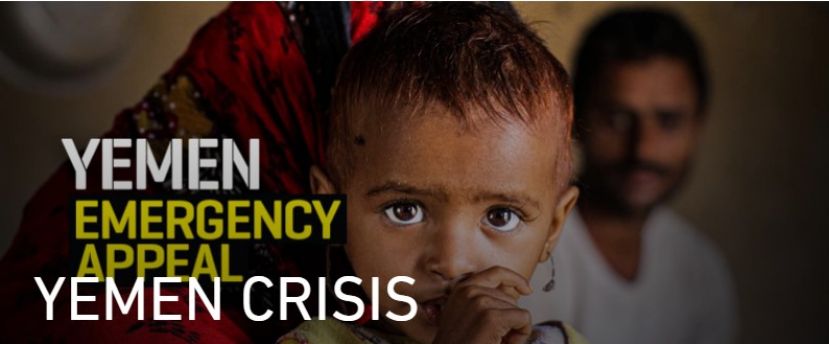Islamic Relief Organizations Pledge $10M to Help The People of Yemen
- Written by Admin TOA
- Published in Associations
ALEXANDRIA, Va. – Rising levels of hunger in Yemen, fueled by a deepening currency collapse and massive donor funding shortfalls, have prompted Islamic Relief organizations to inject millions in emergency funding into the war-ravaged country, where the 27 percent death rate for those testing positive for COVID-19 is among the highest in the world. Islamic Relief USA and its partner organization, Islamic Relief Worldwide (IRW), will provide $10 million to provide food, water, sanitation and hygiene projects (WASH), as well as nutrition and health programs. This initiative will attempt to plug a small part of the massive funding gaps after the United Nations fundraising goal of $2.4 billion was unmet. Only half of this amount was pledged, with three-quarters of U.N.-backed programs facing cuts or closures in the coming weeks.
Prior to the cuts, Islamic Relief was working with the UN’s World Food Programme to deliver food packages to 2.3 million people every month. This has since been scaled back by 50 percent, with the same food pack, designed to provide enough food for a family for a month, having to last each family twice as long.
The shortfall comes even as the COVID-19 pandemic has caused the health system to “in effect collapse” according to the U.N.
“The people of Yemen live in some of the most dire and precarious conditions in the world,” said Sharif Aly, chief executive officer of Islamic Relief USA. “The country had already been suffering from massive poverty, warfare, and a cholera outbreak. Then, as in much of the world, COVID-19 struck the nation and further complicated its devastating problems. There’s little doubt that Yemen is suffering from the worst humanitarian crises in the world. We, as a collective society, must do our part, not only to provide aid, but to provide hope.”
Naser Haghamed, CEO of Islamic Relief Worldwide – who visited Yemen last year – said the following:
“The desperation is unimaginable. Grown men and women have been brought to tears because they don’t have food to feed their families. Some tell us they are considering suicide because they don’t know how to cope and the pain of watching their children slowly starve to death is too much. Everywhere you now see elderly, frail women reduced to begging for themselves and their families, but no one has any money left to give.
“Many mothers are so malnourished they don’t produce enough milk to breastfeed their babies, who are left stunted and unable to fend off disease,” Haghamed continued. “Without urgent action we will see mass starvation sweep Yemen and I fear many more innocent people will die.”
With more than 80 percent of the population already reliant on aid to survive, the COVID crisis has hit Yemen extremely hard.
Remittances from Yemenis living abroad are estimated to have declined by up to $10 billion while out of the more than 1,150 confirmed COVID cases there have been more than 300 deaths, meaning that those diagnosed have a less than one in four chance of surviving.
Islamic Relief’s Country Director in Yemen, Zulqarnain Abbas, described the conditions on the ground:
“While woefully inadequate testing is highlighting the impact of the pandemic to some extent, it is not showing what our teams fear is the true extent of the crisis. We know it has made it to overcrowded IDP camps and to some rural communities. But with access to proper healthcare extremely limited and very few isolation facilities operational, we just don’t know for sure how many people are being impacted.
“Our teams are seeing first-hand not only the suffering of the Yemeni people but also the health workers struggling to provide support,” Abbas said.
“They don’t have PPE equipment and say they face an impossible choice – to stay at home and keep their family safe, or go to work and risk getting infected because there is no PPE kit and there is very little testing so it is sometimes hard to know who is ill.
“Some have resorted to using their already limited salaries – almost exclusively paid by NGOs like ours since the health system completely collapsed earlier this year – to buy their own protective gear. But this does not leave enough to feed their families. The hunger crisis is truly touching every household and family, and the scars will be felt for years to come.
“We’re doing everything we can to keep delivering aid despite the restrictions on the ground. Every day we circumvent checkpoints, administrative delays and flare-ups in violence to ensure aid still reaches those in need. With 325 staff and over 3,000 volunteers we have unique local knowledge that allows us to operate in 17 out of the country’s 22 governorates and ensures our staff are always on the front line of this crisis.”
Related items
- Islamic Relief USA to Distribute Food Boxes With Wesley Housing Development Corp
- Islamic Relief USA Approves Emergency Response to Provide Hot Meals to Texas Residents
- Donations for Palestine Are Hitting Lows When The Needs Are Increasing
- Special Ramadan Greeting from Members of Congress
- Halfway through Ramadan
Latest from Admin TOA
- World Energy Council Türkiye Holds the Opening Meeting of the Young Energy Leaders (YEL’26) Program
- The Shared Pulse by Eda Uzunkara
- NEO HUMAN 10.0: How Will the Future Be Shaped? (Filiz Dag)
- Calculatit.net Is Bringing Pricing Transparency to America’s Construction Industry
- Support Independent, Trustworthy Journalism









